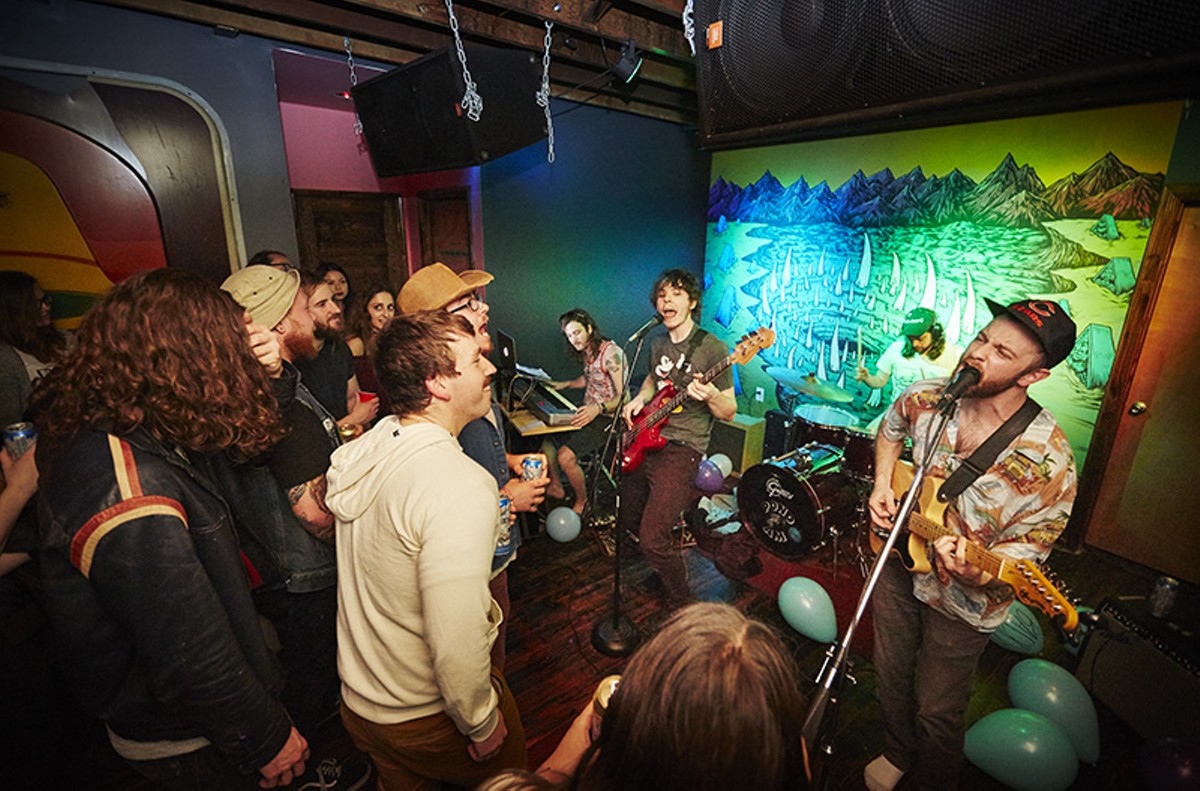As a newcomer walks up to Tucker's on South Broadway, another patron is on the way out, though his stay outside is limited to a sharp left turn and a quick whiz onto a nearby fence. Inside the tavern, it's neither bright nor dark but is relatively quiet, with maybe a dozen patrons fanned out around an L-shaped bar, heckling their afternoons and evenings away. No matter where you face, somewhere within your sightline is signage for Eddie Tucker, the place's eponymous owner and a candidate for a heavily contested, multi-candidate aldermanic race in south city's 11th ward.
Tucker was out sick on this evening, as he was a few weeks prior, when, on a weekday visit, almost the exact same number of customers were seated around the bar in roughly the same pattern. On that day, a commotion broke out around a strange smell wafting through the bar, stirred by a patron who blurted out, "It smells like cappuccino in here!"
You could drink in bars on South Broadway for 100 years and never hear one described as smelling of cappuccino, making this an amazing moment to eavesdrop. Turns out that a quiet guy with a mid-bar spot had just changed his vape flavor; a couple of hits on the vape pipe stirred the action. For a few minutes, conversation pepped up and became universal, everyone uniting in trying to identify the smell, then commenting on it, interrupting the previous discussion about how radio frequency IDs irrevocably changed the cross-country shipping business.
Tucker's is currently the southernmost bar along a 1.9-mile strip of urban life running through the neighborhoods of Carondelet and Patch, a stretch that includes eight bars of various stripes. On a given night, you can find indie troubadours, drag queens, bikers and neighborhood regulars mixed into these rooms.
And while some outsiders might find eight bars in that short stretch a lot, old-timers figure that at least two-dozen were found along the same strip a couple of decades back. The shuttered one next door to Tucker's, most recently known as the Foundry, is a bar in search of an owner right now, a turnkey operation if ever there was one.
But South Broadway is not in decline. Quite the contrary. South Broadway feels, these days, like it's getting a new jolt of youthful energy. Two spots with roots on Cherokee, namely the Livery Company and the Sinkhole, opened on Broadway last year. And now neighborhood denizens are starting to think about the possibility of the area becoming a destination.
Attorney Haden M. Smith grew up just across the River Des Peres and currently lives in the Carondelet neighborhood; his wife, attorney Sophie A. Smith Zavaglia, is currently president of the Carondelet Business Association. In short, they're invested.
Haden Smith says that the bars on Broadway reflect the inherent quirks of the area. "I've always been fascinated by the melting pot aspect of South Broadway," he explains. "You have one of the oldest-running gay bars in the city alongside biker bars and soccer bars and live music venues, and even a bar with an obnoxious Trump sign thrown in. You have people who grew up in the neighborhood or very close by, transplanted Cherokee Street entrepreneurs, and also a ton of people from southern Missouri who migrated up 55. But the common thread is that nearly everyone who works or hangs out here today is very laid back and nonjudgmental. I've heard some ugly stories about past South Broadway bars" — including, he says, a Cardinals backbencher "getting the shit kicked out of him by racist rednecks" in one bar in the 1980s. But, he adds, "I think we do a pretty good job of getting along today. I'm proud of our lack of snobbishness and 'you're not from around here' exclusion."
Currently the Broadway strip is bereft of good restaurants and, in some parts, even residents. But to those who see its possibilities, those apparent detriments might provide room for opportunity — and the kind of prices that make an area appealing to those with a sense of adventure. The neighborhood, they say, has potential like never before.
"The best thing about the boom in development along Cherokee in the last fifteen years or so is that it has pulled the central corridor further south in the imaginations of a lot of people who previously wouldn't venture past Arsenal," Smith says. "I think the next logical step is swinging further south and east to take advantage of not only the affordability but also the river views, the architecture and the 18th/early 19th century street grid in Carondelet."






